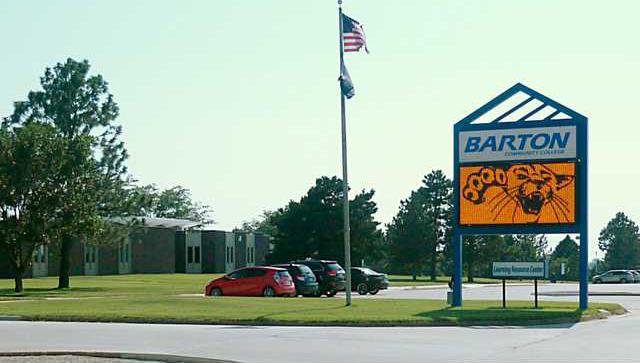Barton Community College plans to hold the line on its request for local tax dollars while adding 5% to the budget for salaries next year. The BCC Board of Trustees approved an operating budget and a published budget when it met Monday.
Vice President of Administration Mark Dean explained that the operational budget and the published budget are two different documents. The published budget is a 72-page form submitted to the State of Kansas and its cover page is published as a legal notice in the Great Bend Tribune.
By law, entities now report the Revenue Neutral Rate (RNR), which is the mill levy that is expected to raise the same amount of tax dollars as the previous year. When valuations go up, as they have this year, the RNR is lower.
The County’s estimated valuation increased by $12.6 million this year, mainly due to increases in real estate, personal property and utilities. Oil valuation was $70 last year and dropped to $65.
Last year’s BCC RNR was certified at 29.754 although a late change dropped the mill levy to 29.691. The RNR for Fiscal Year 25 was provided by the County and is 28.634.
“This should generate the same tax dollars as requested last year,” Dean said. “Because the RNR is based on an estimated valuation there is always the chance that the certified valuation could increase or decrease. Because of this, we have notified the County Clerk of our intention to exceed the RNR and will have an RNR hearing. We do this in the event that the certified valuation is less than the estimate. Again, the total tax dollars will not change and we would remain revenue neutral.”
Wording in the RNR statute makes this necessary, Dean said. In the future, the wording will be amended and if the college intends to be revenue-neutral it can simply set the RNR as it is doing now; if the actual valuation requires an adjustment, the adjustment will be automatic.
Public hearings
The budget summary to be published in the Thursday, July 25 Tribune includes notice of two public hearings before the budget is officially approved. The RNR hearing and budget hearing will start at 4 p.m. on Tuesday, Aug. 27, in Room F-30 of the Fine Arts Building on campus. The purpose of the meeting is to answer objections of taxpayers relating to the proposed use of all funds, and the amount of tax to be levied, $9,574,623. That is slightly less than the $9,590,036 levied last year.
The budget summary shows the total expenditures and transfers from all funds were nearly $46.5 million in 2022-2023 and $49.3 million in 2023-2024. The proposed budget for 2024-2025 always shows a much higher number, which Dean explains in the maximum budget authority and is more than the college is likely to spend. This year it is $79.4 million.
Operational budget
The administration presented two options for next year’s operational budget and the trustees chose the recommended option that increases revenue by $823,777 and expenditures by $105,428 over last year’s budget. It does the following:
• Increases revenue by $823,777 and increases expenditures by $105,428 over last year’s operational budget.
• Provides 5% increase to the salary budget to keep up with the market value salary level per Performance Solutions. Increases the starting salary levels by the same 5%.
• Includes a reduction of approximately 11 full-time positions for FY25.
• Includes increases in cost for health insurance, Social Security taxes, and other benefits.
• Includes reductions in operational budgets.
• Includes a planned deficit of $394,823 at the end of FY25.
It remains revenue neutral for tax revenue. The deficit will depend on enrollment growth and responsible spending throughout the year. It will come from cash reserves. Last year’s budget projected a deficit of $1,113,172 but the final deficit was $227,865.
It was noted that not all employees will receive a 5% wage increase. Some may receive more, and some less. The college uses Performance Solutions to provide compensation guidance. The college attempts to maintain wages that are comparable to the market value of similar jobs in this area.





